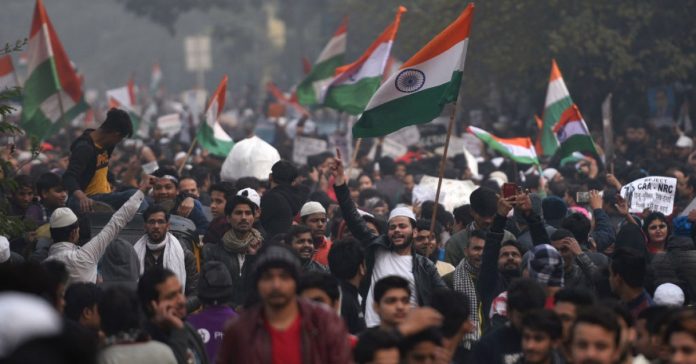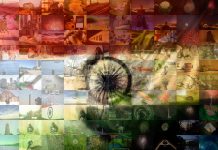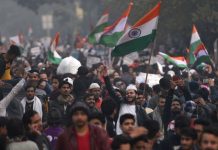This article has been written by Sushmita Choudhary, a BBA LLB student from New Law College, BVDU, Pune. This article talks about how and why rising nationalism in the current times is a worrisome situation.
Table of Contents
Introduction
The feeling of love and pride towards the nation is purely natural. It is inherent in almost every human being throughout the world. In general, the concept of nationalism can be defined as a feeling of unity in diversity, oneness and love and pride towards the nation and its people by its citizens. The term ‘nationalism’ as described by Tara Chand is a ‘state of mind in which the supreme loyalty of the individual is due to the nation-state’. It emphasizes the identity of the state or nation to the people.
Indian nationalism developed as a concept when India was facing its freedom struggle against the colonial British Raj. Indian nationalism includes the territory factor because it consists of its entire people, irrespective of their diverse ethnic and religious backgrounds. In 1885, the nationalist movement of India acquired a structured form when the Indian National Congress got set up and upped new hopes and aspirations for an independent India. Nationalism in India can be seen as the sentiment of growth and development of anti-colonialism.
Present scenario
However looking at the recent debates on nationalism, the term is being redefined to attain political goals. The concept which motivates a citizen to do good for the country is being used explicitly for personal gains. There have been lots of growing misconceptions and propaganda which are maligning the word ‘nationalism’.
The idea of nationalism becomes negative the moment it is associated with irrational blaming and unnecessary spreading of hate among the people. Nationalism cannot be identified in the name of religion, caste, race or community. It is beyond all these. In current days, the debate of nationalism vs anti-nationalism is reaching different heights. The views are mostly being used for political gain through spreading misconception and half-truths. In order to show love and respect towards the nation, one should not take the law in his hands and become violent.
Hindu nationalism or Hindutva as a driving force
The ‘Hindu’ nationalist idea differs completely from its secular counterpart. It generates from the notion that secular nationalism is a fake foreign imposition pulled off by elites at the time of independence. This type of nationalism promotes the idea that secularism obscures India’s true Hindu identity and its cultural sensibilities. Believers of Hindu nationalism bear the idea that the ultimate source of the country’s identity is Hinduism.
According to Vinayak Damodar Savarkar, the writer of the book ‘Hindutva’ whose writings are considered as an important source by many passionate Hindu nationalists, India at its core is a Hindu nation. A Hindu is anyone who regards the Indian territory as both his motherland and holy land. Hindus, Sikhs, Jains and Buddhists fulfil both criteria. The Christians and Muslims though are the progeny of Hindus, they should regard India as their holy land too to become a part of the nation.
The belief of Hindu nationalism is fundamentally a Hindu Rashtra(nation). The present Indian territory, they argue, is closely linked to ancient religious and cultural Hindu tradition which makes it deserving to get pride of place above all other traditions found within India’s present borders. The interrelation between religion and culture according to some scholars is indispensable. This mentality is unparalleled to the secularist approach according to which religion and culture have distinct concepts.
How and why ‘rising nationalism’ is worrisome
Fading secularism
According to The India Spend survey, 90% of religious hate crimes in the last decade have occurred since the Modi government came to power. It is for the first time since 2004 that the United States Commission for International Religious Freedom has recommended that India be a country of particular concern in 2020 in its annual reports. A country is designated such a title when its governments engage in ‘systematic, ongoing, egregious’ violations of religious freedom. India is in the dubious company- with the countries on the list this year which includes Pakistan, China, North Korea, Russia and Saudi Arabia. The USCIRF reports that India’s “history of religious freedom has come under attack in recent years with the growth of exclusionary allowance and encouragement of mob violence against religious minorities-that have facilitated an egregious and ongoing campaign of violence, intimidation, and harassment against Non-Hindu and lower-caste Hindu minorities”.
Around 80% of India’s population is Hindu, with the rest including Muslims, Christians and others. Under the populist rule of the present government, India has drifted away from secularism and its politics has tarnished Indian democracy. That shift has accelerated since the reelection of the Prime Minister in May 2019 to a second five-year term. The minority Indians who constitute 20% of the population, as well as secular-minded liberals, have been overly concerned that the BJP along with RSS is determined to remake India as an explicitly Hindu Rashtra or state.
Mob Lynchings
In the past years of the BJP led government, India has witnessed several instances of lynchings in which frenzied mobs have targeted people mainly because of their religious or caste identity- for being Muslim or Dalit.
In 2015, the murder of Md. Akhlak, a 52-year-old Muslim man by a mob of villagers in Dadri district of Uttar Pradesh due to suspicion of storing beef was the first high profile case during Prime Minister Narendra Modi’s first tenure. It was highlighted by the national and international press and the incident went on being followed by several similar cases in other parts of the country like the killing of Pehlu Khan in 2017 by a group of 200 cow vigilantes in Alwar, Rajasthan. Six others who were present with Pehlu Khan were also beaten. The vigilante group was affiliated with right-wing Hindutva groups in Rajasthan. The lynching of a 24-year-old Tabrez Ansari by a mob on suspicion of bike theft in Jharkhand came up in 2019. He was tied to a tree while being brutally beaten by the angry mob and was also forced to chant Hindu sayings. He died several days later. That incident came to light after a video of the lynching went viral. In the same week, a Muslim cab driver named Faizal Usman Khan was beaten up by a group of men at night near Mumbai. When he begged for mercy, the lynchers asked him to chant Jai Shri Ram which is now a rallying cry for Hindu nationalists in the country.
Another subversion of ‘democracy’
Prime Minister Narendra Modi and the right-wing Hindu nationalist Bharatiya Janata Party had long opposed the existence of Article 370 in Jammu and Kashmir. Revoking it was a part of its 2019 election manifesto. At the beginning of August 2019, there were signs of something in process in Kashmir with tens of thousands of additional troops of soldiers being deployed, Amarnath Yatra being cancelled, schools and colleges being ordered shut, tourists ordered to leave, telephone and internet services being suspended and regional political leaders being put under house arrest. Speculation was there that Article 35A of the Indian constitution, which empowered the Jammu and Kashmir state legislature to define the meaning of ‘permanent residents’ of the state and provide special rights and privileges to those residents, would be scrapped.
However, the government stunned everyone by revoking nearly all of Article 370 of which 35A is a part and which was a ground of assurance to the people of Jammu and Kashmir that their sovereignty and integrity will be respected at any cost. This article has been a basis of controversy for some 70 years.
The majoritarian government argued that it needed to be scrapped in order to ensure the integration of Kashmir with the rest of India and to put it on the same footing. However, critics say that the abrogation of that article from Jammu and Kashmir should emanate from its citizens and the centre’s move of repealing it was a disregard of the consent of the people of Jammu and Kashmir which is a major setback to democracy. The government broke up the state into two smaller, federally-administered territories. One region is combined with Muslim majority Kashmir and Hindu majority Jammu. The other region is Buddhist-majority Ladakh. A number of petitions have been filed in the Supreme Court by private individuals, activists and political parties.
While talking to Sabrang India, a news organization, Shah Faesal, an IAS topper turned politician from Kashmir said that the people of Jammu and Kashmir decided to stay with India based on the presumption that it is a democracy. In 1953, when Sheikh Abdullah, the chief minister of Kashmir was handcuffed in a very humiliating manner, it was the generation of his grandparents. In 1987, which was a generation of his parents, the elections happened which were rigged and hence, another subversion of democracy.
Till then, this generation had memories of betrayal. In 2019, that is his generation, Article 370 has been abrogated which is seen as a massive betrayal robbing people of their symbol, their pride, their identity and their history. He said that this is a generational injury. Previously, there were three schools of thought in Kashmir- 1. A massive majority of people who had no faith in India 2. A section which had some faith 3. A minority which had faith in integration with India. As per Shah Faesal, he was in the second category. But following this, all the schools of thought have been merged into one and that is no faith in India. Previously, they had some hope to find a solution within the Indian constitution. So many political activists have been arrested in the past 2 years and the two Chief Ministers have been detained in the most humiliating manner. Moreover, the political activists are held under draconian laws such as PSA (Public Safety Act) and are in jail. He was of the opinion that peacebuilding has been impossible now. It will just transform the conflict. For his people, this revocation of Article 370 has been like a nuclear bomb which wiped out the whole regional identity and history of the state. He also said that the ones who are welcoming this decision should know that this subversion of democracy could happen to any state. The move according to critics also fits in with Modi’s desire to show his tough stance on Kashmir and Pakistan.
CAA and NRC
The parliament on December 12, 2019, passed a highly contentious Citizenship Amendment Act which fast-tracks Indian citizenship for Hindus, Sikhs, Buddhist, Christians, Parsis and Jains who arrived in India before December 31, 2014, from its neighbouring Muslim majority countries namely Pakistan, Bangladesh and Afghanistan. So, by making the process of attaining citizenship easy for all the non-muslim people, this law paves the way for Muslims to be unfairly disadvantaged to be citizens of India on the basis of their religion. From then on, the country has been awash with protests. Thousands of people took to the streets in defiance of this amendment. The Anti-CAA protests were initiated from Assam, where the BJP had supported the implementation of a National Registry for citizens under the orders from the Supreme Court in 2015. When the NRC was implemented in Assam, 19 lakh people were left out. The ruling party caused anxiety among its citizens when it announced that NRC will be held on a pan-Indian level.
Diversion
Creating illusionary enemies in the name of nationalism is being used as a weapon to divert attention from issues of food, education and health. The Indian economy was already dying and the spread of COVID-19 has brought it to the verge of extinction.
The Indian economy before the Covid-19 pandemic was already in its worst phase, with the GDP falling to an 11-year low of 4.2 per cent in 2019-2020. In the January-March quarter part of the 2019-2020 budget, the economy grew by 3.1 per cent against 5.7 per cent at the same time a year ago. This was witnessed to be the slowest growth in at least 8 years. According to the National Statistical Office data, the manufacturing sector grew merely by 0.03 per cent in the Financial year 2019-2020 whereas it grew by 5.7 per cent in the previous year. The growth of the construction sector, which is responsible for a spillover effect on several other industries, too declined to 1.3 per cent.
Conclusion
The present form of nationalism that has been induced in citizens of this country has taken a communal colour under the umbrella of Hindutva or Hindu nationalism which is contrary to the principles of Hinduism. India has a majoritarian government in the ruling which is swiftly exploiting the sense of patriotism to suit its politics. From the above-given data, it is not hard to conclude that this pirated version of nationalism is being created to divert people from the poor performance of the economy, rising capitalism, degrading secularism, diminishing press freedom, the plight of migrant labourers and poor handling of the crisis of Covid-19.
LawSikho has created a telegram group for exchanging legal knowledge, referrals and various opportunities. You can click on this link and join:
 Serato DJ Crack 2025Serato DJ PRO Crack
Serato DJ Crack 2025Serato DJ PRO Crack











 Allow notifications
Allow notifications


